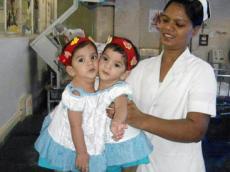|
|
TODAY.AZ / Weird / Interesting
Doctors successfully separate conjoined Indian sisters – PHOTOS
22 June 2012 [14:36] - TODAY.AZ
 A pair of 13-month-old conjoined sisters, who were abandoned by their poverty-stricken parents, have been successfully separated.
A pair of 13-month-old conjoined sisters, who were abandoned by their poverty-stricken parents, have been successfully separated.Aradhana and Stuti were left at the Missionary Hospital in Padhar, India, after they were born on May 11 last year, because their parents could not afford to take care of them. Their father Hariram Yadav is a poor local farmer who has just two acres of land.
The twins, who were joined at the chest, were separated yesterday during a 12-hour operation involving 23 doctors and 11 nurses from India and Australia. They were wheeled in the operation room at 8am, before the surgery followed from 9am to 9pm.
The team first separated their hearts, which were joined by the same membrane, followed by their fused livers. Hospital Superintendent Dr Rajiv Choudhry said he was happy with how the surgery went. The special sisters will now remain on ventilators and under close observation for the next 48 hours.
The team had done a dry run of the entire procedure beforehand.
The surgery was funded by Indian TV viewers and local politicians after hearing of their plight.
The outpouring of generosity, with thousands of small donations by members of the public, is unusual in India where girls are often not valued in rural communities and disabled babies are often abandoned.
Public generosity was matched by a £22,000 fund from the Madhya Pradesh state government.
The girls have been cared for by hospital staff since their birth, with three nurses taking shifts to act as surrogate mothers. Surgeons at the under-equipped Paddar Hospital spent months appealing for international help and preparing for the operation.
The hospital persuaded the parents, who already have a six-year-old son, to continue having a relationship with their daughters. The couple Hari Ram Yadav and Maya Yadav now hope to take their girls home after surgery.
'We are happy that they will finally get to be a family and both the girls will get a proper home,' said Vikas Sonwani, assistant administrator of Paddar Hospital.
Conjoined twins occur in around one in every 200,000 live births. They are identical - coming from a single egg that doesn't fully separate after fertilization and therefore always the same sex.
Their prospects vary widely depending on their general state of health, how they are joined and what organs are shared.
Between 40 to 60 per cent of conjoined twins are stillborn and around 35 per cent survive only one day. The overall survival rate of conjoined twins is somewhere between five and 25 per cent. Female twins are three times as likely as males to be born alive.
Surgical separation is still rare. According to the University of Maryland , at least one twin has survived separation about 75 per cent of the time since 1950. One of the earliest documented cases of conjoined twins were Mary and Eliza Chulkhurst. They were born joined at the hip in 1100 in Kent and were know as the Biddenden maids. They died aged 34.
/dailymail.co.uk/
URL: http://www.today.az/news/interesting/109156.html
 Print version
Print version
Views: 4251
Connect with us. Get latest news and updates.
See Also
- 05 February 2025 [19:41]
Japan plans to negotiate with Trump to increase LNG imports from United States - 23 January 2025 [23:20]
Dubai once again named cleanest city in the world - 06 December 2024 [22:20]
Are scented candles harmful to health? - 23 November 2024 [14:11]
Magnitude 4.5 earthquake hits Azerbaijan's Lachin - 20 November 2024 [23:30]
Launch vehicle with prototype of Starship made its sixth test flight - 27 October 2024 [09:00]
Fuel prices expected to rise in Sweden - 24 October 2024 [19:14]
Turkiye strikes terror targets in Iraq and Syria - 23 October 2024 [23:46]
Kazakhstan supplied almost entire volume of oil planned for 2024 to Germany in 9 months - 23 October 2024 [22:17]
Taiwan reported passage of Chinese Navy aircraft carrier near island - 23 October 2024 [21:50]
Russia remains largest oil supplier to India
Most Popular
 Foreign Ministers of China, South Korea and Japan hold meeting in Tokyo
Foreign Ministers of China, South Korea and Japan hold meeting in Tokyo
 President Ilham Aliyev held expanded meeting over lunch with Somali President
President Ilham Aliyev held expanded meeting over lunch with Somali President
 Pashinyan vs Dashnaks: are new purges starting in Armenia?
Pashinyan vs Dashnaks: are new purges starting in Armenia?
 Next batch of humanitarian aid sent to Ukraine
Next batch of humanitarian aid sent to Ukraine
 MÜS?AD outlines strategic steps for economic resilience
MÜS?AD outlines strategic steps for economic resilience
 Istanbul Airport witnesses growth in number of passenger & cargo traffic
Istanbul Airport witnesses growth in number of passenger & cargo traffic
 "Russian House" in Baku begins full evacuation amid closure
"Russian House" in Baku begins full evacuation amid closure








